Securing the right financing is crucial for real estate investors anywhere, but nowhere is this need more pronounced than in New York. With sky-high real estate prices, the DSCR loan New York stands out as a game-changing option. With a DSCR loan, real estate investing in New York goes from prohibitively expensive and risky to highly feasible and lucrative.
At Defy Mortgage, we understand the unique needs of real estate investors in New York (and elsewhere!). Our expertise in DSCR loans, bank statement loans, and foreign national loans has empowered borrowers of all kinds, providing a transparent and stress-free mortgage experience in a variety of states including New York, Florida, California, Massachusetts and more. We’ve approved numerous loans for high-value real estate purchases in various competitive markets across the U.S. and are keenly aware of the best practices to get approved for such loans.
Using our experience in DSCR loans in general, we’ve created this comprehensive guide to familiarize you with the intricacies of DSCR loans in New York. We’ll explore the different types of properties that qualify for DSCR loans in the state, as well as discuss the several financial implications of these loans. By the end, you will be able to make highly informed decisions on getting started with DSCR loans in New York — or decide if a different state or loan option is better for you.
Read on to find out how to tap into the potential of DSCR loans to achieve your real estate investment goals in New York.
What is a DSCR Loan?
A Debt Service Coverage Ratio loan is a specialized financing option for real estate investors, designed to fund the acquisition of income-generating properties. The DSCR loan meaning hinges on its core metric: the Debt Service Coverage Ratio, which is the ratio between the property’s profitability and its annual debt obligations, including mortgage payments, property taxes, and other dues like HOA fees.
What makes DSCR loans so appealing to real estate investors is the focus on the property’s income potential rather than the borrower’s personal financial history. This allows investors with fluctuating or unconventional income streams, such as freelancers and self-employed individuals, to secure financing based on the property’s potential income. DSCR loan programs are especially advantageous for those who might not qualify for traditional mortgages but have their sights set on promising properties.
Why DSCR Loans are Popular in New York
Real estate investors prefer DSCR loan New York because of the state’s highly energetic property market. DSCR loans give investors more flexibility by allowing them to capitalize on even the most expensive properties available. Here are the top reasons why they’re so popular in New York:
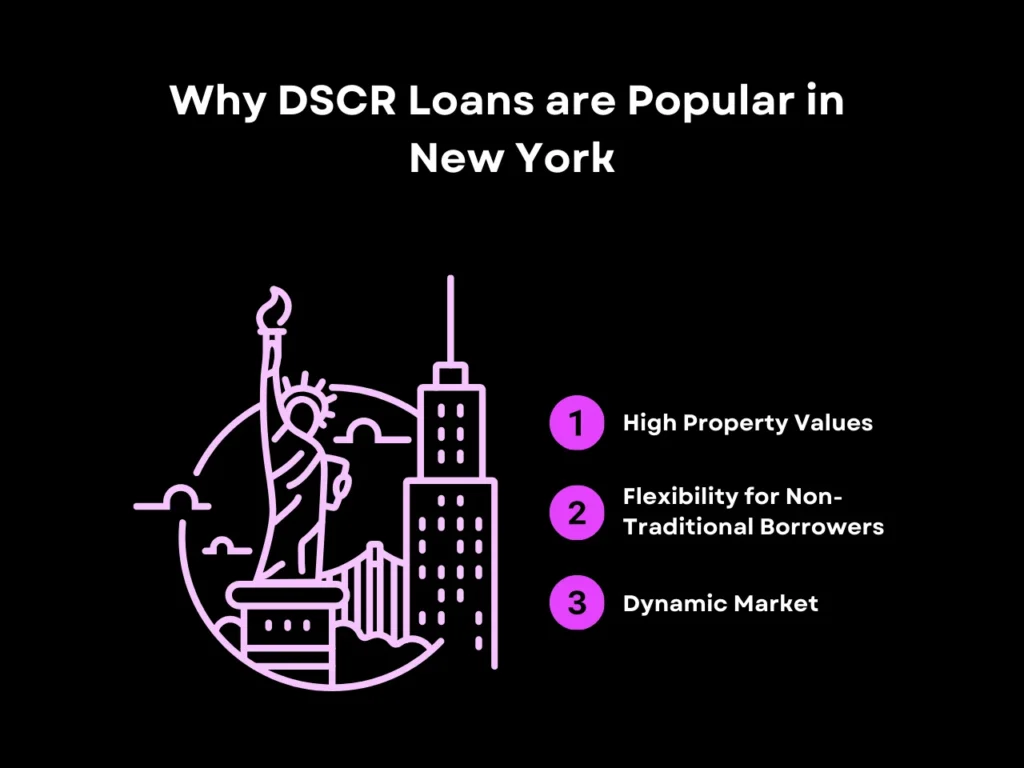
- High Property Values: New York’s sky-high property values and record rents are daunting, yet they also promise robust rental income. DSCR loans are a good option to surmount the prohibitive real estate prices and tap into these lucrative income streams.
- Flexibility for Non-Traditional Borrowers: Many real estate investors in New York are freelancers, self-employed entrepreneurs, or otherwise might not have traditional W-2 income documentation. Lenders tend to be discouraged by their irregular incomes for conventional loans, but with a DSCR loan, they mostly base their decision on the property’s income rather than the borrower’s personal finances.
- Dynamic Market: New York real estate is ever-changing, with fluctuations in market values and rental demand and highly diverse property circumstances that can affect many facets of business. These can be considered critical issues when applying for a traditional loan, but a DSCR lender only needs to check whether the property can service the debt in spite of these challenges to approve financing.
And it’s not just NYC–real estate across New York State tends to come with a hefty price tag, second only to California. Real estate in Upstate New York, such as in Albany, can be much cheaper, but then you’ll have to start worrying about vacancy rates and the challenges of attracting consistent tenants in less populated areas. Conventional loans might shy away from the high stakes of NY real estate, but taking out a DSCR loan in New York empowers you to turn these costs into profits.
Regulatory and Market Considerations in New York
New York’s regulatory environment adds another layer of complexity to DSCR loans. Factors such as property values, rental demand, and local economic trends shape loan terms. Rent-stabilized apartments in Manhattan, for example, have caps on rent increases, impacting income potential and, therefore, the DSCR of such properties. Additionally, New York City’s strict zoning laws can influence the types of properties that can be developed or renovated, affecting their income potential and overall market value.
Market trends are equally crucial. In NYC, for example, the rapid fluctuations in property values and rental demand can affect the viability of an investment. During economic downturns, rental income may decrease, impacting the DSCR and the lender’s risk assessment. High-demand areas like Brooklyn or Queens are somewhat insulated from this, but they often have the most prohibitive property prices, affecting the investment’s potential return and the terms of DSCR loans available. Understanding these elements can help investors make informed decisions when seeking a DSCR loan in New York.
Types of Properties Suitable for DSCR Loans in New York
DSCR loans were designed for investment properties of all kinds. Here’s what you need to know about the types of properties that you can take out a DSCR loan in New York:
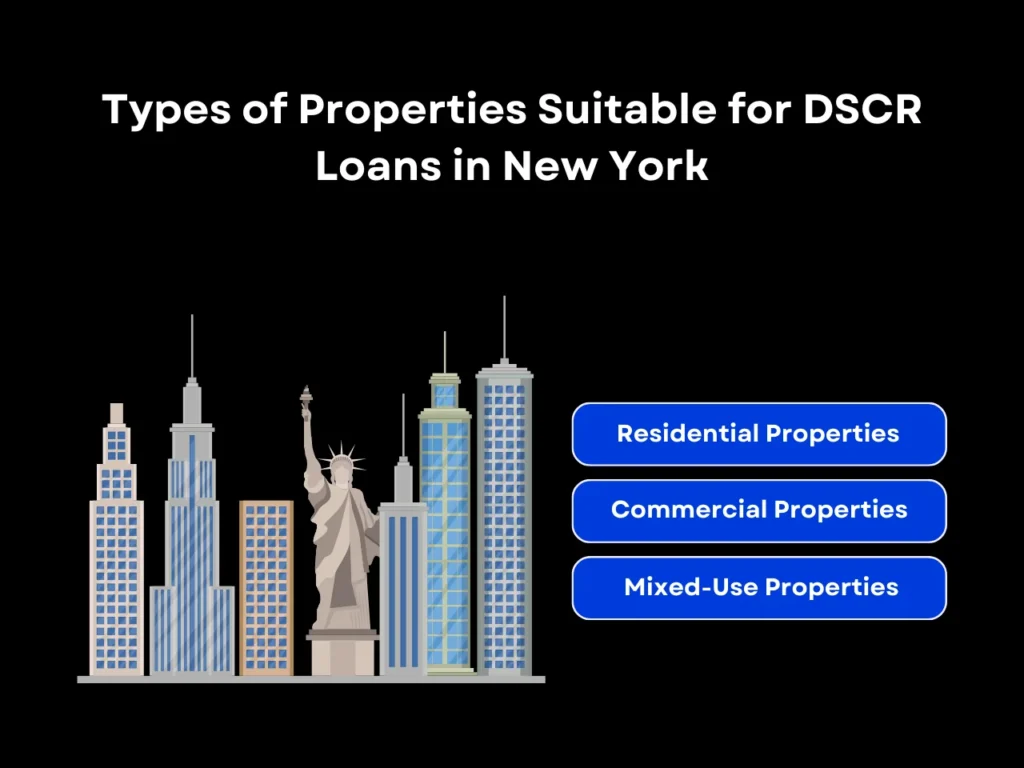
Residential Properties: The Ideal Investment Property Type in New York
New York’s economy is resilient, often bouncing back swiftly even after economic downturns. Although rental income for commercial properties in the state has its ups and downs, the vacancy rate throughout New York State remains remarkably low even amid economic fluctuations.
This makes residential real estate the safest type of property to invest in in NY. There is no shortage of occupants looking for rental properties with ideal accommodations and fair rates. So as long as you do proper maintenance and offer competitive rent rates, vacancies will be virtually unheard of.
Evaluating Residential vs. Commercial Properties
When comparing the income potential of residential versus commercial real estate in New York, you should evaluate whether the commercial property you’re looking at will earn more income than a residential property of comparable price.
In some of the state’s most high-traffic cities, such as Buffalo and NYC, this could be a possibility, but in the majority of cases, residential properties often offer greater stability and consistent revenue. Of course, you can find exceptions in commercial or mixed-use properties that will be used for businesses that earn large amounts of money, enough to make them more feasible than a residential property of a similar value.
Special Considerations for Mixed-Use Properties
Mixed-use properties can be a great option if you can purchase a piece of real estate with strong commercial revenue potential, such as a popular retail space or office complex. However, there are certain unique challenges that you should plan for involving management and market fluctuations, such as coordinating a highly diverse range of tenants and adapting to varying market demands.
The Financial Implications of DSCR Loans

Understanding the financial implications of DSCR loans is essential for making informed investment decisions. These loans offer unique benefits but also come with specific costs and risks that borrowers must carefully evaluate.
Interest Rates and Fees to Expect
Interest rates and fees for DSCR loans vary based on factors like property type and location. Although DSCR loans focus on the property’s financial health, the borrower’s personal finances can also be scrutinized, including their credit history and whether they’re earning enough income. Some lenders may ask for documents such as your credit report, tax returns, etc. At Defy, however, we don’t ask for any personal documents for DSCR loans at all, whether in New York or another state.
Typically, a lower DSCR ratio means more risk for the lender, often resulting in higher interest rates. Lenders can also charge fees such as origination fees, appraisal fees, and underwriting fees. These can all drive down your DSCR ratio if they’re recurring fees, so be sure to verify what fees lenders charge before your DSCR loan application.
Comparing DSCR Loans with Traditional Mortgages
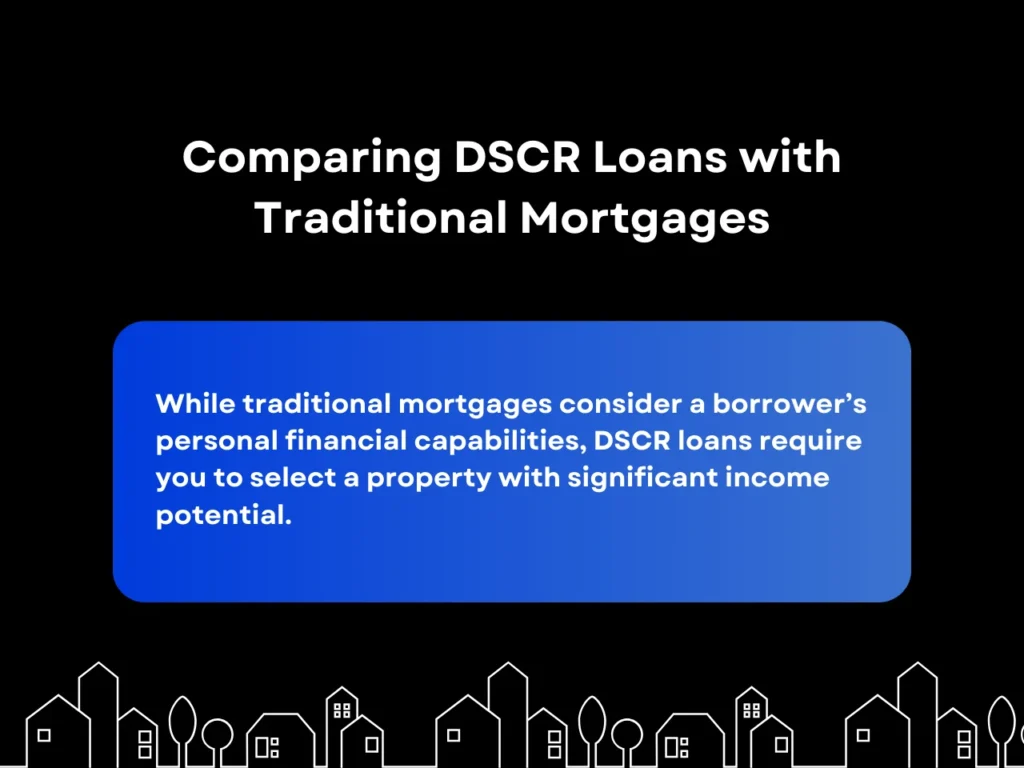
While traditional mortgages consider a borrower’s personal financial capabilities, DSCR loans require you to select a property with significant income potential. This provides you with a number of key advantages:
Greater Flexibility: Borrowers with non-traditional income sources can get financing much more easily even if they don’t qualify for a traditional loan. As long as they have an eye for profitable properties and are good at property management, they can secure a DSCR loan with good terms.
Rapid Portfolio Scaling: Investors can take advantage of the flexibility offered by DSCR loans to quickly build up their portfolios, such as by leveraging both traditional property investment lenders and DSCR loans. By maxing out your borrowing capacity with traditional lenders as well as taking out DSCR loans, you can expand your holdings by much more than if you only used either one.
Better Loan Terms: Since DSCR loans depend on how lucrative a property is, the more profitable the property you can obtain, the better loan terms and the loan amount you can secure. This can be particularly advantageous in markets where property values and income potential are on the rise, because it allows you to capitalize on that growth even with minimal upfront capital.
Remember that although DSCR loans place less emphasis on the borrower’s finances, lenders may still look at your credit score to judge whether you’re a good payer. At Defy, we approve DSCR loans for borrowers with a FICO score of at least 620.
Long-Term Financial Impact and Risk Analysis
Securing a DSCR loan can have significant long-term financial benefits, particularly for investors who are looking to expand their real estate portfolios. DSCR loans can provide a large amount of capital to acquire income-generating properties, allowing investors to make use of rental income for consistent growth and reinvestment into the property to improve its market value. As the value of your property increases due to market appreciation and property improvements, you build equity that can be tapped into through refinancing or leveraging it as collateral for future investments.
As with any investment strategy, there are certain risks, such as market fluctuations, changes in tenant occupancy rates, and variable rent income, which can all affect your DSCR rating and loan terms. However, the long-term benefits of a well-chosen DSCR-financed property, such as property appreciation and potential for reinvestment, can make your rental income steadier and shield you against income fluctuations and unexpected expenses.
DSCR Loan New York FAQ
What Makes DSCR Loans Different from Other Loans?
DSCR loans focus on the property’s income potential rather than the borrower’s personal income, making them ideal for investment properties. This approach allows borrowers to leverage the rental income of the property to secure financing, offering greater flexibility for real estate investors and business owners.
Can I Use a DSCR Loan for Non-Residential Properties?
Yes, DSCR loans can be used for commercial properties, provided they meet the lender’s requirements. These loans are suitable for various types of income-generating properties, including office buildings, retail spaces, industrial properties, and mixed-use developments.
What is the Minimum DSCR to Qualify for a Loan in New York?
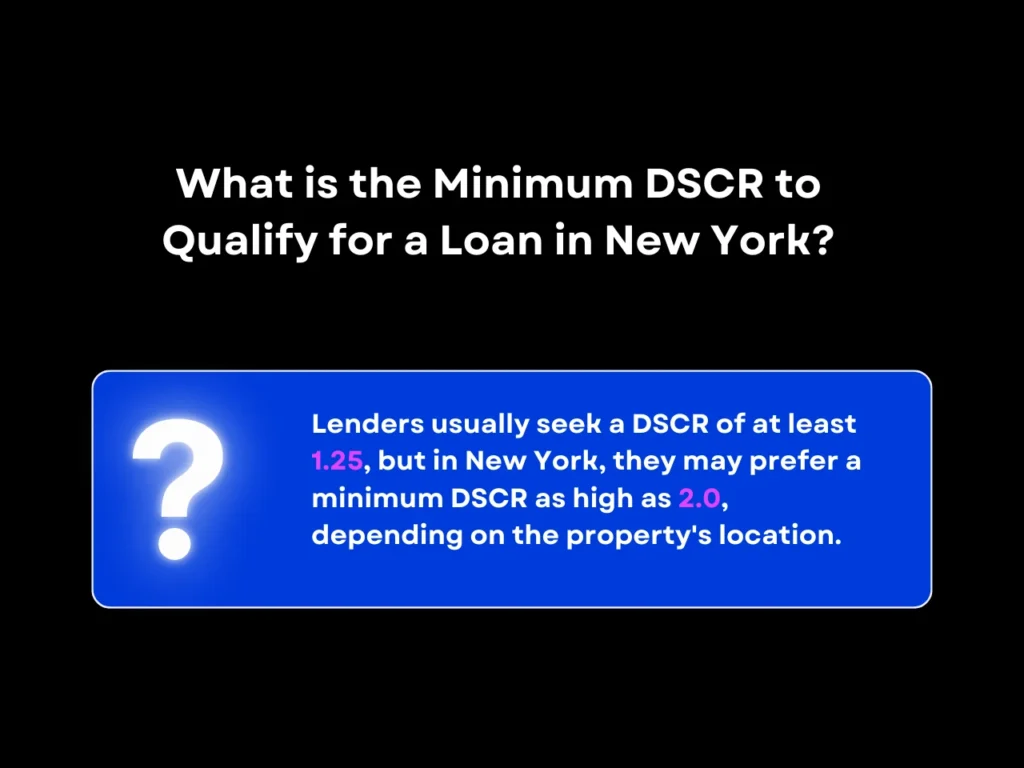
Lenders usually look for a DSCR of at least 1.25, but with how expensive New York is, lenders in the state may prefer a minimum DSCR as high as 2.0, depending on where the property you want to purchase is located. However, Defy offers DSCR loans for properties with DSCR ratios as low as 0.75, including in the state of New York. We also have interest-only options for investors who want to optimize their cash flow.
How Long Does the DSCR Loan Process Take?
The DSCR loan process can take anywhere from a few weeks to a few months, depending on the complexity of the loan and the lender’s requirements. The timeline may be influenced by factors such as property appraisal, underwriting procedures, and sometimes income verification, but the process is usually shorter than the conventional mortgage process because borrowers aren’t required to submit tax returns or W-2 income. Some lenders ask for other personal documents, such as bank statements, but Defy asks for none of these, shortening the mortgage process even further.
Are There Prepayment Penalties for DSCR Loans?
Some DSCR loans may have prepayment penalties, so it’s important to review the loan terms carefully. Prepayment penalties can vary based on the lender and the specific loan agreement, and they may apply if the borrower pays off the loan before a certain period. Keep in mind that this also varies by lender.
Can DSCR Loans Be Refinanced in New York?
Yes, DSCR loans can often be refinanced, allowing borrowers to take advantage of better terms or lower interest payments. Refinancing can provide opportunities to reduce monthly loan payments, access additional capital, or improve loan terms based on changes in the property’s cash flow or market conditions.
What Are My Options If I Don’t Live in NY and Can’t Get a DSCR Loan in New York?
If you can’t obtain a DSCR loan in New York, consider working with out-of-state DSCR lenders, partnering with a local co-investor, or exploring other financing options like portfolio loans can also increase your chances. You might also consider investing in a nearby state, such as Maryland. Defy provides DSCR loans with options for foreign investors who don’t have a US credit score or social security number.
How Does Rental Income Affect DSCR Loan Eligibility?
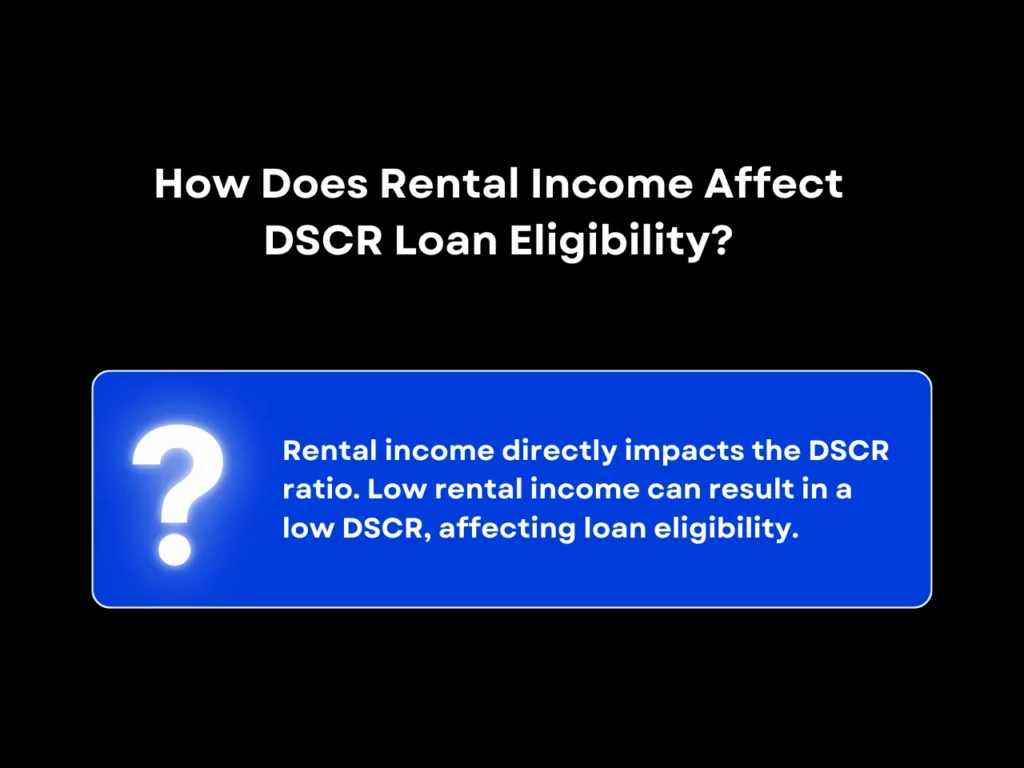
Rental income is directly related to how high your actual DSCR ratio will be, given that it’s your property’s net income divided by its total debt service. Low rental income can give a property a low DSCR and thus negatively affect its eligibility for a DSCR loan.
Key Takeaway
The DSCR loan New York is one of the most powerful tools for real estate investment in the state due to its expensive property market, but it does come with its own challenges. Borrowers often need to prove that they can effectively maximize a property’s ability to generate income before they’re approved for a DSCR loan. There are also financial implications, including higher interest rates and fees, as well as challenges specific to New York, such as stringent regulations and market volatility.
If you’re looking to get a DSCR loan in New York, remember to conduct a thorough risk analysis, ensure you have a robust property management plan, and be prepared to demonstrate the property’s income potential convincingly. Don’t forget to verify all fees associated with the loan and understand the local market conditions to make informed decisions.
Want a simpler, stress-free real estate investment experience? Contact us at Defy, and we’ll help you navigate the intricacies of DSCR loan requirements or any other type of loan you prefer, such as fix-and-flip loans, P&L loans, and more.




